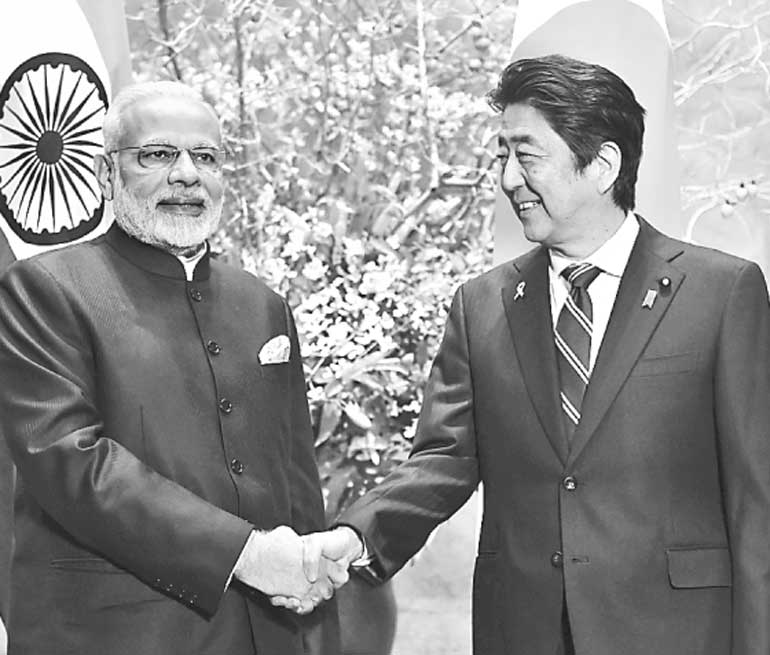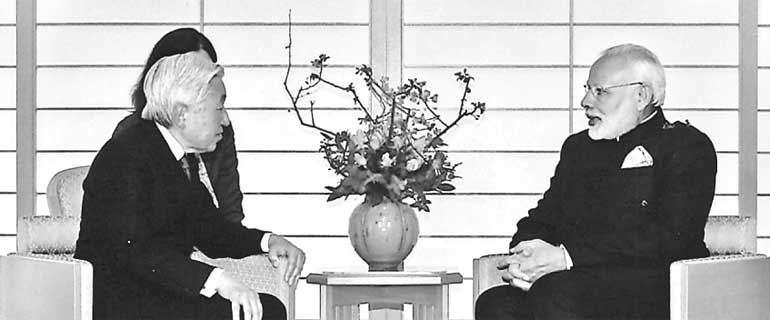Saturday Feb 21, 2026
Saturday Feb 21, 2026
Saturday, 12 November 2016 00:59 - - {{hitsCtrl.values.hits}}
Reuters: Japan and India signed a civilian nuclear accord on Friday, opening the door for Tokyo to supply New Delhi with fuel, equipment and technology for nuclear power production, as India looks to atomic energy to sustain its rapid economic growth.
It was the first time Japan, the only country to have suffered a nuclear attack, has concluded such a pact with a country that is not signatory to the Nuclear Non-proliferation Treaty (NPT).
The accord stipulates nuclear fuel and equipment provided can only be used for peaceful purposes, and a separate document signed alongside the nuclear agreement has a clause allowing Japan to terminate the pact if India conducts a nuclear test.
Friday's accord was signed after Prime Minister Shinzo Abe's meeting with his Indian counterpart Narendra Modi.
India says the NPT is discriminatory and it has concerns about nuclear-armed China as well as its long-time nuclear-armed rival, Pakistan.
 Indian Prime Minister Narendra Modi (L) is welcomed by his Japanese counterpart Shinzo Abe upon his arrival for their meeting at Abe's official residence in Tokyo, Japan November 11, 2016. REUTERS
Indian Prime Minister Narendra Modi (L) is welcomed by his Japanese counterpart Shinzo Abe upon his arrival for their meeting at Abe's official residence in Tokyo, Japan November 11, 2016. REUTERS
India is in advanced negotiations with U.S.-based Westinghouse Electric, owned by Japan's Toshiba Corp, to build six nuclear reactors in southern India, part of New Delhi's plan to ramp up nuclear capacity more than ten times by 2032.
For Japanese nuclear plant makers such as Toshiba and Mitsubishi Heavy Industries Ltd, it is crucial to expand their business overseas as the 2011 Fukushima nuclear disaster chilled domestic demand for new nuclear plants.
The nuclear agreement with Japan follows a similar one with the United States in 2008 which gave India access to nuclear technology after decades of isolation.
That step was seen as the first big move to build India into a regional counterweight to China.
Modi earlier on Friday praised the "growing convergence" of views between his nation and Japan, saying strong ties will enable them to play a stabilising role in Asia and the world.
Reuters: Prime Minister Narendra Modi on Friday praised the “growing convergence” of views between his nation and Japan, saying strong ties will enable them to play a stabilising role in Asia.
Modi is in Japan to sign a landmark nuclear energy pact and strengthen ties as China’s regional influence grows and Donald Trump’s election has thrown US policies across Asia into doubt.
India, Japan and the United States have been building security ties by holding three-way naval exercises, but Trump’s “America First” campaign promise has stirred concern about a reduced US engagement in the region – an approach that could draw Modi and Japanese counterpart Shinzo Abe closer.
Modi told Japanese business leaders that the 21st century is Asia’s century, urging them to invest in India.
“The growing convergence of views between Japan and India and our special strategic and global partnership have the capacity to drive the regional economy and development, and stimulate global growth,” he said.
“Strong India and strong Japan will not only enrich our two nations, it will also be a stabilising factor in Asia and the world.”
 Indian Prime Minister Narendra Modi (R) talks with Japan's Emperor Akihito during a meeting at the Imperial Palace in Tokyo, Japan November 11, 2016. Imperial Household Agency of Japan/Handout via REUTERS
Indian Prime Minister Narendra Modi (R) talks with Japan's Emperor Akihito during a meeting at the Imperial Palace in Tokyo, Japan November 11, 2016. Imperial Household Agency of Japan/Handout via REUTERS